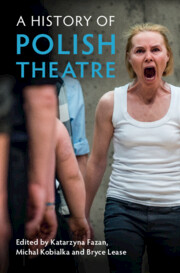Book contents
- A History of Polish Theatre
- A History of Polish Theatre
- Copyright page
- Contents
- Figures
- Notes on Contributors
- Acknowledgements
- A Note on Terminology
- Introduction
- Chapter 1 Where Is Poland? What Is Poland?
- Chapter 2 Staropolski (Old Polish) Theatre
- Chapter 3 The Public Stage and the Enlightenment
- Chapter 4 Romanticism
- Chapter 5 Mapping Theatre (I)
- Chapter 6 Mapping Theatre (II)
- Chapter 7 Modernist Theatre
- Chapter 8 Avant-Gardes
- Chapter 9 Theatre during the Second World War
- Chapter 10 Political Theatres
- Chapter 11 Ritual Theatre
- Chapter 12 Actors and Animants
- Chapter 13 Writing and Dramaturgy
- Chapter 14 Theatre Ontologies
- Index
Chapter 4 - Romanticism
Published online by Cambridge University Press: 09 December 2021
- A History of Polish Theatre
- A History of Polish Theatre
- Copyright page
- Contents
- Figures
- Notes on Contributors
- Acknowledgements
- A Note on Terminology
- Introduction
- Chapter 1 Where Is Poland? What Is Poland?
- Chapter 2 Staropolski (Old Polish) Theatre
- Chapter 3 The Public Stage and the Enlightenment
- Chapter 4 Romanticism
- Chapter 5 Mapping Theatre (I)
- Chapter 6 Mapping Theatre (II)
- Chapter 7 Modernist Theatre
- Chapter 8 Avant-Gardes
- Chapter 9 Theatre during the Second World War
- Chapter 10 Political Theatres
- Chapter 11 Ritual Theatre
- Chapter 12 Actors and Animants
- Chapter 13 Writing and Dramaturgy
- Chapter 14 Theatre Ontologies
- Index
Summary
In this constellation on Polish Romanticism, Zbigniew Majchrowski argues that messianic Romanticism became a language of consolation that gave hope and promise of freedom and, at the same time, turned out to be a language of collective violence against individualist existential projects. And as Włodzimierz Szturc adds, this negative dialectic was a fertile ground for one of the most important topics in the Polish drama and theatre, that of death and history, which can only transcend the real decline of states, nations and their cultures in the process of abstracting them, as will be evidenced in the works of many Polish playwrights and directors inhabiting other critical constellations in the volume. He argues that understanding the rights and standing of the peasantry in contrast to the szlachta (nobility) reveals forms of national affiliation and patriotism and the problems presented in cultural nostalgia or sublimation of the past.
Keywords
- Type
- Chapter
- Information
- A History of Polish Theatre , pp. 100 - 123Publisher: Cambridge University PressPrint publication year: 2022

